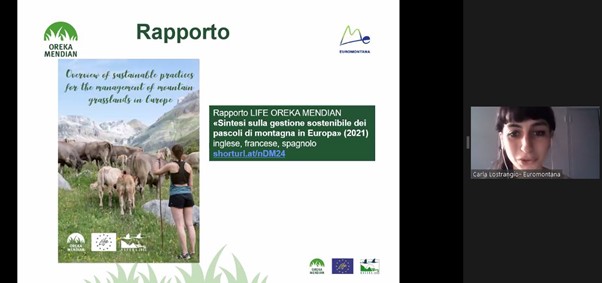On 7th October 2021, Euromontana participated to the virtual event “From transhumance to shepherd schools: environmental, cultural and economic value of pastoralism” organised in the framework of the Interreg Italy-France Maritime Cambio Via project. This project aims to improve the public measures sought to preserve the natural and cultural landscapes created by transhumance routes.
The virtual event explored the contribution of pastoralism to natural and cultural services, with specific examples from Italy, as well as to discuss upon the challenges and opportunities of pastoralism in Europe and the future perspectives given by a rising number of shepherd schools.
During this event, Carla Lostrangio, Project Manager at Euromontana, presented the study “Overview of sustainable practices for the management of mountain grasslands in Europe” recently published by the LIFE OREKA MENDIAN project in three languages (English, French, Spanish).
In particular, Carla Lostrangio presented:
- The current socio-economic and environmental challenges affecting mountain grasslands and pastoral practices;
- Different policies that at EU and national level are supportive for mountain shepherds, with a specific mention to the French and Swiss legislation;
- 3 good practices out the 31 examples of the OREKA MENDIAN booklet to innovate pastoralism : E-Barana (Spain), the Alpine Pastoral Network in Auvergne-Rhône-Alpes (France) and the implementation of the Optional Quality Term “mountain product” in Romania;
- Some of the 17 policy recommendations evidenced from the outputs of the report.
Despite the multiple challenges impacting pastoral practices today, existing policies and bottom-up initiatives offer good examples of ways to ensure the continuation of this profession.











